|
|
|
Sort Order |
|
|
|
Items / Page
|
|
|
|
|
|
|
| Srl | Item |
| 1 |
|
| 2 |
ID:
115622
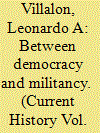

|
|
|
|
|
| Publication |
2012.
|
| Summary/Abstract |
The effort to try to distinguish between good and bad Muslim ideologies may be much less important than the need to support functional political institutions.
|
|
|
|
|
|
|
|
|
|
|
|
|
|
|
|
| 3 |
ID:
151486
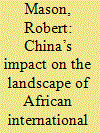

|
|
|
|
|
| Summary/Abstract |
Since China began enhancing its economic relationship with key African oil exporters from the early 1990s, the effect this has had on the International Relations (IR) of Africa has remained largely unknown. This paper delves into African IR theory and finds that, rather than representing an alternative pole for African states to bandwagon with, China’s limited interest in Africa and its international socialisation, along with a possible growth of the middle class in Africa, is likely to give many African states few alternatives than those which have existed thus far in the postcolonial period. More development options are found to lie in sub-regional integration.
|
|
|
|
|
|
|
|
|
|
|
|
|
|
|
|
| 4 |
ID:
099192
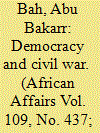

|
|
|
|
|
| Publication |
2010.
|
| Summary/Abstract |
The civil war in Côte d'Ivoire presents unique features with respect to the causes of civil wars and the nature of peace processes in West Africa. It is a conflict largely driven by concrete political and social grievances over citizenship. In addition, it is marked by a significant effort by the belligerents to take ownership of the peace process and negotiate directly. This article traces the civil war to the politicization of citizenship and ethnicity during the democratization process. It argues that the peace agreements engineered by the international community failed to end the conflict largely because they relied heavily on traditional peace formulas and paid insufficient attention to the underlying issue of citizenship. In contrast, the peace agreement forged by Ivorians has been relatively successful because it directly addressed the citizenship issue and restored domestic ownership of the peace process. This article focuses on the peace process and the intrinsic relation between citizenship and progress toward peace in Côte d'Ivoire. In addition, it connects the discourse on democracy in Africa with the salient issue of citizenship and underscores the fluidity of citizenship and democracy in African politics.
|
|
|
|
|
|
|
|
|
|
|
|
|
|
|
|
| 5 |
ID:
168201
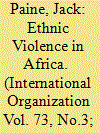

|
|
|
|
|
| Summary/Abstract |
What explains differential rates of ethnic violence in postcolonial Africa? I argue that ethnic groups organized as a precolonial state (PCS) exacerbated interethnic tensions in their postcolonial country. Insecure leaders in these countries traded off between inclusive coalitions that risked insider coups and excluding other ethnic groups at the possible expense of outsider rebellions. My main hypotheses posit that PCS groups should associate with coups because their historically rooted advantages often enabled accessing power at the center, whereas other ethnic groups in their countries—given strategic incentives for ethnopolitical exclusion—should fight civil wars more frequently than ethnic groups in countries without a PCS group. Analyzing originally compiled data on precolonial African states provides statistical evidence for these implications about civil wars and coups between independence and 2013 across various model specifications. Strikingly, through 1989, thirty of thirty-two ethnic group-level major civil war onsets occurred in countries with a PCS group.
|
|
|
|
|
|
|
|
|
|
|
|
|
|
|
|
| 6 |
ID:
100196
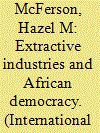

|
|
|
|
|
| Publication |
2010.
|
| Summary/Abstract |
y the well-known "resource curse," the abundance of oil and other valuable minerals has been associated with patrimonialism and repression-in Africa and elsewhere. This article demonstrates a self-sustaining dynamic: lack of accountability enables elite appropriation of resources which in turn raises the monetary value of political control and finances continued repression. Several initiatives have been taken in recent years to foster transparency in mineral production and revenue, but with marginal impact. Lifting the curse requires a robust global effort to discourage "plunder oil." This is unlikely as long as the benefits of cheap oil to the importing countries outweigh the costs to the population of the exporting countries. The oil addiction of developed and emerging economies remains an oil malediction for African democracy. But launching a sustained international debate could eventually bear fruit.
|
|
|
|
|
|
|
|
|
|
|
|
|
|
|
|
| 7 |
ID:
147822
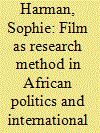

|
|
|
|
|
| Summary/Abstract |
This research note reflects on the use of film as a method in researching politics and international relations in African countries. It is based on the experiences of producing a feature-length drama about the everyday risk of HIV/AIDS, using real people and their stories in Tanzania. The intent of the film, Pili, is to challenge international aesthetics of HIV/AIDS in film and how people understand the complexities and structural politics of disease. It is argued that the film itself is not the only outcome or contribution to knowledge. The external narrative or process of how the film was made, the method of doing, also produces new ways of thinking about ethics, collaboration, and navigating the state in conducting research. The research note makes this argument by first reflecting on the origins and debates of visual method, and then exploring what film as a research method reveals about structure and agency, research collaboration, ethics, and the state.
|
|
|
|
|
|
|
|
|
|
|
|
|
|
|
|
| 8 |
ID:
145906
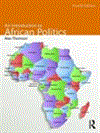

|
|
|
|
|
| Edition |
4th ed.
|
| Publication |
Oxon, Routledge, 2016.
|
| Description |
ix, 298p.: tables, maps, platespbk
|
| Standard Number |
9781138782846
|
|
|
|
|
|
|
|
|
|
|
|
Copies: C:1/I:0,R:0,Q:0
Circulation
| Accession# | Call# | Current Location | Status | Policy | Location |
| 058715 | 320.9/THO 058715 | Main | On Shelf | General | |
|
|
|
|
| 9 |
ID:
174647
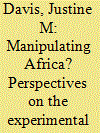

|
|
|
|
|
| Summary/Abstract |
A push for evidence-based approaches to the study of politics, dubbed the ‘credibility revolution’, has resulted in a proliferation of experiments and randomized control trials (RCTs) in Africa. The current emphasis on the strength of the experimental method has vast ramifications for our understanding of political phenomena and real-world realities faced by local populations. Yet, very little work focuses on the practical challenges that may arise if and when researchers and students decide to use this method.
|
|
|
|
|
|
|
|
|
|
|
|
|
|
|
|
| 10 |
ID:
192312
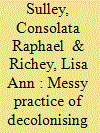

|
|
|
|
|
| Summary/Abstract |
This article1 explores the messy practice of decolonising a concept through collaborative work between scholars researching together the meaning of everyday humanitarianism in Tanzania. Humanitarianism is typically understood as the state-centric, formal, Northern-driven helping of distant others in crisis. Using the concept of everyday humanitarianism, our article challenges these assumptions in three ways. First, it explores the everyday humanitarian actions of ordinary citizens in times of crisis. Second, it explores these responses in a Southern context. Third, it focuses explicitly on the givers and not only the receivers of humanitarian help. Our work grounds decolonisation in the actual practices of research aimed at theory building as an iterative back-and-forth exchange with particular attention to power, rather than as a transplant of Northern theory on the South, or its opposite. Our first argument is that the objective of collaborative research to capture the local politics of giving and then use these practices to interrogate the theoretical concept of everyday humanitarianism can be decolonising. Second, we argue that the practices of the academic labour that produces knowledge or inductive theory can also be decolonising. Understanding both the challenges and the possibilities of decolonising ‘humanitarianism’ will provide an opportunity to document and thus legitimate the complexity that is inherent in decolonising a discipline.
|
|
|
|
|
|
|
|
|
|
|
|
|
|
|
|
| 11 |
ID:
144698
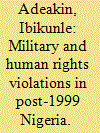

|
|
|
|
|
| Summary/Abstract |
Nigeria is currently faced with a series of internal security challenges that threaten the very existence of the country. In the areas where conflict has erupted, the military has been consistently accused of violating human rights during its operations. The aim of this article is to explore the claims of human rights abuses levelled against the military and assess the prospect of an effective internal enforcement mechanism. The study that forms the basis of this article involved interviews with 18 high-ranking serving and retired military officers. The empirical results suggest that there are four main areas that need to be strengthened to limit the alleged cases of human rights violations.
|
|
|
|
|
|
|
|
|
|
|
|
|
|
|
|
| 12 |
ID:
131809
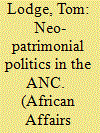

|
|
|
|
|
| Publication |
2014.
|
| Summary/Abstract |
Following Jacob Zuma's ascension to the presidency in South Africa, the African National Congress (ANC) has been dogged by rumours of escalating corruption and the personalization of power. This article documents these trends and explores three ways of understanding neo-patrimonialism in South Africa's ruling party. First, the article addresses the possibility that such political habits have a long history within the ANC but were restricted during its years in exile and have begun to resurface now that the armed struggle is over. Second, it considers explanations that relate to the party's historical ties to criminal networks and pressures arising from the transition to majority rule and contemporary electoral politics. Finally, the article investigates whether neo-patrimonialism is a reflection of broader tendencies within South African political and economic life. All three factors are found to have played a role in the rise of neo-patrimonial politics, and it is the confluence of these trends that explains why these dynamics have taken such a strong hold on the party.
|
|
|
|
|
|
|
|
|
|
|
|
|
|
|
|
| 13 |
ID:
193272
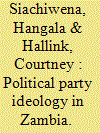

|
|
|
|
|
| Summary/Abstract |
This paper challenges existing analyses of party cleavages in Sub-Saharan Africa which over-emphasise the centrality of ethnicity. Parties express ideological positions that reflect the socio-economic interests of specific regions, which, especially in Zambia, coincide with particular ethnic groups. We demonstrate this through an examination of party manifestos, policy documents and semi-structured interviews with members of two political parties in Zambia – the Patriotic Front and the United Party for National Development. These parties express clear normative ideas about social welfare, especially the role of the state in providing social assistance to the poorest. These ideological positions reflect the socio-economic interests of the ethnic groups and regions where support for each party is dominant. These are shaped by the ways in which these regions were historically incorporated into the colonial economy. In order to gain a better understanding of African politics, ethnicity must be conceptualised as a socio-cultural construct and situated historically.
|
|
|
|
|
|
|
|
|
|
|
|
|
|
|
|
| 14 |
ID:
142183
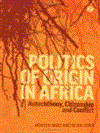

|
|
|
|
|
| Publication |
London, Zed Books, 2013.
|
| Description |
viii, 149p.pbk
|
| Standard Number |
9781848139961
|
|
|
|
|
|
|
|
|
|
|
|
Copies: C:1/I:0,R:0,Q:0
Circulation
| Accession# | Call# | Current Location | Status | Policy | Location |
| 058406 | 320.6/BOA 058406 | Main | On Shelf | General | |
|
|
|
|
| 15 |
ID:
127145
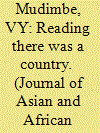

|
|
|
|
|
| Publication |
2013.
|
| Summary/Abstract |
Here is an intellectually dense reading of Chinua Achebe's personal history of Biafra, which deconstructs and illuminates the book. Deconstructive components expose elements of Achebe's narrative that fly beyond the intellectual grasp of his hasty castigators, many of whom vented without having read the book. In the related vein, the illuminative components expose the obligation and burden that Achebe discharged in the book as a Biafran. It is therefore a book whose narrative retraces the responsibility of Achebe's faith vis-à-vis a historical challenge, which he fulfilled with determination by writing it.
|
|
|
|
|
|
|
|
|
|
|
|
|
|
|
|
| 16 |
ID:
152383
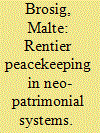

|
|
|
|
|
| Summary/Abstract |
International peacekeeping in Africa has developed dynamically in the last decade. The majority of global missions are deployed to the continent, the largest regional contingent of troops comes from Africa, and the African Peace and Security Architecture has made significant progress. Peacekeeping is Africanized today more than at any time before. However, mainstream research has insufficiently paid attention to African agency in this context. This article sheds light on the often neglected influence of African politics on international peacekeeping missions. The focus is set on the consequences of neo-patrimonial political systems, which can use international peacekeeping missions as an opportunity to generate rents. It will be shown that such a rent-seeking approach is highly problematic for the troop-contributing as well as mission-hosting countries. Instead of curbing conflict, rentier peacekeeping is prolonging and exporting it. The empirical examples used are the Burundian and Kenyan involvement in peacekeeping in Somalia.
|
|
|
|
|
|
|
|
|
|
|
|
|
|
|
|
| 17 |
ID:
131793
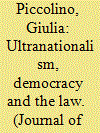

|
|
|
|
|
| Publication |
2014.
|
| Summary/Abstract |
Although much has been written about the ideology of Laurent Gbagbo's Front Populaire Ivoirien in Côte d'Ivoire and its impact on the Ivorian politico-military crisis, little attention has been paid to the ubiquitous role of the law in the discourse and political strategy of the pro-Gbagbo elite. The Ivorian case may provide important insights about the connection between ultranationalist ideology and a legalist, formalist conception of democracy and national sovereignty. The article analyses the circumstances of the emergence of 'legalist nationalism' in Côte d'Ivoire by looking at key episodes of the Ivorian transition between 2002 and 2012. The article discusses the relevance of Pierre Englebert's concept of 'legal command' and the turbulences of democratic transitions in accounting for the prominence of legalism in Ivorian politics. It explores the implications of the Ivorian case for understanding the connection between law and politics in Africa.
|
|
|
|
|
|
|
|
|
|
|
|
|
|
|
|
| 18 |
ID:
123320
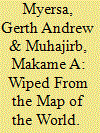

|
|
|
|
|
| Publication |
2013.
|
| Summary/Abstract |
This essay uses the case of Zanzibar in its complicated relationship with the United Republic of Tanzania (of which it is a part) as a lens on debates in political geography on empirical and conceptual approaches to critical geopolitics. We test the veracity of a multi-faceted critical geopolitics in the contemporary public contestation of Zanzibar's place in the United Republic from 2008-2012. We analyze Tanzanian media, the speech acts of Tanzanian leaders, and the key events and processes related to what is termed the 'Zanzibar problem' during the selected years, to make two points about a critical geopolitics approach: to strengthen critical geopolitics by broadening the analysis of language to engage political acts and languages beyond the Global North; and taking 'subaltern geopolitics' more seriously via engagement with critical geopolitical voices on discourses, events and processes from the Global South.
|
|
|
|
|
|
|
|
|
|
|
|
|
|
|
|
|
|
|
|
|